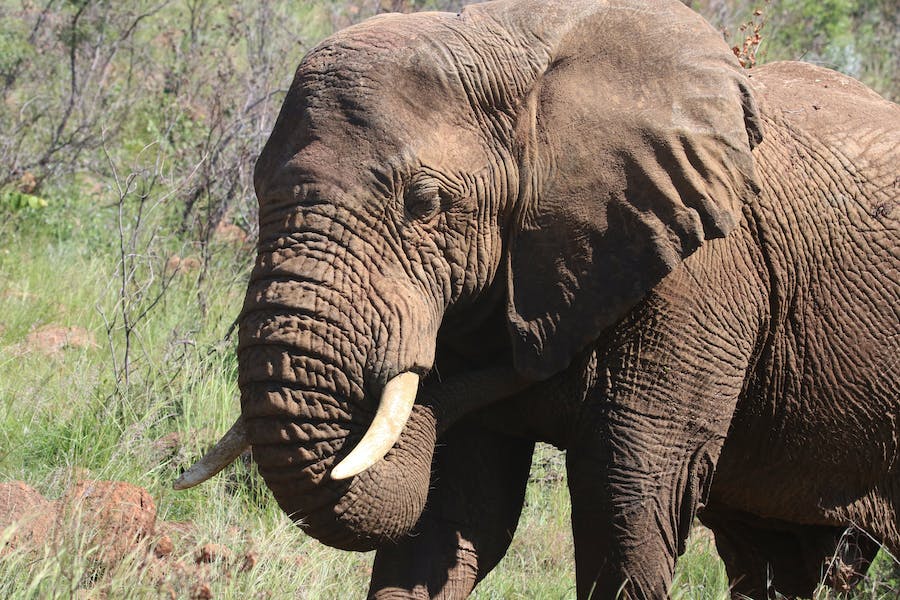Elephants are majestic creatures that have been revered in many cultures for their strength, wisdom, and power.
Their symbolism and spiritual significance have been studied and interpreted for centuries, revealing a deep connection between these gentle giants and the spiritual realm.
In many cultures, elephants are seen as messengers from the spiritual world, representing protection, guidance, and support.
They are believed to possess great wisdom and longevity, and their presence is often associated with new beginnings and powerful transformations.
The spiritual meaning of elephants can be interpreted in many ways, depending on the context and the culture.
Some see them as a symbol of fertility and abundance, while others view them as a representation of the divine feminine and nurturing energy.
Regardless of how they are perceived, it is clear that elephants hold a special place in the hearts and minds of people around the world.
Elephant Symbolism and Spiritual Meaning

Elephants have been revered by many cultures and religions for centuries. They are known for their strength, power, wisdom, and good luck.
In some parts of the world, elephants are considered an emblem of royalty and power.
As a spirit animal, elephant represents strength and support during tough times. If you are going through a long and hard journey, elephant can help you find the strength to make it through.
They are also known to symbolize loyalty and commitment, making them a great spirit animal for those who are taking care of friends or family during tough times.
Elephants are also believed to be messengers from the spiritual realm. They can bring messages of strength, power, and fertility.
They represent transformation and growth, and can help you find new beginnings or powerful changes in your life.
In many cultures, elephants are associated with the third eye chakra, which is believed to represent intuition and spiritual awareness.
The third eye chakra is located in the center of the forehead and is associated with the color indigo.
Elephants are believed to help open and balance this chakra, allowing for greater spiritual awareness and intuition.
In addition to their spiritual meaning, elephants are also known for their intelligence and social behavior.
They have been observed mourning their dead and caring for their young in complex ways.
Elephants are also known to communicate with each other through a variety of sounds and body language.
Overall, elephant symbolism and spiritual meaning are associated with strength, power, wisdom, and intuition.
They are a powerful spirit animal that can bring support and guidance during tough times, and can help you find new beginnings and transformation in your life.
15 Spiritual Meanings of Elephant
Elephants have been revered and admired in many cultures for centuries due to their majestic appearance and gentle nature.
In spiritual circles, elephants are believed to embody a range of qualities, including wisdom, strength, and power. Here are 15 spiritual meanings of elephants:
1. Power
Elephants are known for their immense physical strength, which makes them a symbol of power and might.
They are often associated with the ability to overcome obstacles and challenges, making them a popular symbol of strength.
2. Wisdom
Elephants are believed to possess great wisdom, which is reflected in their calm and measured demeanor.
They are known to be intelligent creatures that can remember things for a long time, making them a symbol of knowledge and wisdom.
3. Steadfastness
Elephants are known for their steadfastness and determination, which makes them a symbol of resilience and perseverance.
They are believed to be able to weather any storm, making them a symbol of strength and endurance.
4. Longevity
Elephants are known for their long lifespans, which makes them a symbol of longevity and endurance.
They are believed to be able to live for many years, making them a symbol of hope and longevity.
5. Loyalty
Elephants are known for their strong bonds with their family members, which makes them a symbol of loyalty and devotion.
They are believed to be fiercely protective of their loved ones, making them a symbol of loyalty and trust.
6. Honor
Elephants are known for their sense of honor and dignity, which makes them a symbol of respect and reverence.
They are believed to embody the qualities of nobility and honor, making them a symbol of respect and admiration.
7. Patience
Elephants are known for their patience and calm demeanor, which makes them a symbol of serenity and tranquility.
They are believed to be able to wait for a long time, making them a symbol of patience and endurance.
8. Compassion
Elephants are known for their gentle nature and compassion towards others, which makes them a symbol of kindness and empathy.
They are believed to be able to sense the emotions of others, making them a symbol of compassion and understanding.
9. Protection
Elephants are known for their protective instincts, which makes them a symbol of safety and security.
They are believed to be able to protect their loved ones from harm, making them a symbol of protection and safety.
10. Good Luck
Elephants are believed to bring good luck and fortune, making them a popular symbol of prosperity and abundance.
They are often associated with wealth and success, making them a symbol of good fortune and prosperity.
11. Spirituality
Elephants are believed to have a strong connection to the spiritual realm, making them a symbol of spirituality and enlightenment.
They are often associated with the third eye chakra, which is believed to be the center of spiritual awareness.
12. Transformation
Elephants are believed to be able to transform themselves, making them a symbol of transformation and metamorphosis.
They are often associated with the ability to change and adapt, making them a symbol of transformation and growth.
13. Communication
Elephants are known for their ability to communicate with each other, which makes them a symbol of communication and understanding.
They are believed to be able to convey complex messages, making them a symbol of communication and clarity.
14. Unity
Elephants are known for their strong sense of community and social bonds, which makes them a symbol of unity and togetherness.
They are believed to be able to work together towards a common goal, making them a symbol of unity and cooperation.
15. Abundance
Elephants are believed to bring abundance and prosperity, making them a symbol of wealth and success.
They are often associated with the idea of abundance and plenty, making them a symbol of prosperity and abundance.
Before you leave, see the spiritual meaning of a fox crossing your path.
Elephant in Different Cultures

Elephants have been an important symbol in many cultures for centuries. Here is a brief overview of their symbolism in different cultures.
Elephant in African Culture
In Africa, elephants are associated with strength, power, and royalty. They are also considered to be a symbol of good luck and prosperity.
In some African cultures, elephants are believed to be the spirits of deceased ancestors.
The elephant is also a popular subject in African art, often depicted in masks, sculptures, and paintings.
Elephant in Hinduism
In Hinduism, the elephant is associated with the god Ganesha, who is often depicted with the head of an elephant. Ganesha is the god of wisdom, knowledge, and new beginnings.
The elephant is also considered a symbol of good luck and prosperity in Hinduism. In some Hindu traditions, the elephant is associated with the planet Jupiter.
Elephant in Buddhism
In Buddhism, the elephant represents mental strength and composure. It is also associated with the Buddha’s birth.
According to Buddhist tradition, the Buddha’s mother dreamt of a white elephant before his birth. The elephant is also considered a symbol of wisdom, strength, and longevity in Buddhism.
Elephant in Christianity
In Christianity, the elephant is not a common symbol. However, there are a few references to elephants in the Bible.
For example, in the book of Job, the elephant is described as a symbol of strength and power. In some Christian traditions, the elephant is also associated with the apocalypse.
Overall, elephants hold deep symbolic meaning in many cultures and spiritual traditions. They are often seen as powerful symbols of strength, wisdom, and spirituality.
Recommended post: the spiritual meaning of black vulture.
Elephant as a Totem Animal
Elephant as a totem animal represents strength, wisdom, and power. People who have Elephant as their totem animal are known to be patient, kind, and loyal.
They are also known to be great leaders who are always willing to help others.
Elephant totem animal is also associated with the concept of family. People who have Elephant as their totem animal are known to be family-oriented and always put their family first.
They are also known to be protective of their loved ones and will do anything to keep them safe.
Elephant totem animal is also associated with the concept of ancestral wisdom. People who have Elephant as their totem animal are known to be wise and knowledgeable.
They are also known to be great teachers who are always willing to share their knowledge with others.
In Native American culture, Elephant totem animal is associated with the element of earth.
People who have Elephant as their totem animal are known to be grounded and connected to the earth.
They are also known to be in tune with nature and have a deep respect for all living things.
Overall, Elephant totem animal represents strength, wisdom, and power. People who have Elephant as their totem animal are known to be patient, kind, and loyal.
They are also known to be great leaders who are always willing to help others.
Read the spiritual meaning about horses.
Elephant in Dreams and Their Interpretation

Elephants are one of the most powerful and intelligent animals on the planet.
They are also a popular symbol in many cultures and religions. In dreams, elephants often represent power, wisdom, facing obstacles, luck, stability, and social connections.
Dreaming of an elephant often brings up big issues in life that cannot be ignored. These issues may be overwhelming, or they may be big life decisions that can determine the dreamer’s future.
When interpreting elephant dreams, it is important to consider the context of the dream. For example, dreaming of a herd of elephants may represent a need for connection and unity.
Elephants, in their natural behavior, exhibit strong familial bonds, underlining the true meaning of an elephant herd in the dream state.
It may be a sign of the subconscious urging the dreamer to seek or acknowledge the support of their own community.
Dreaming of elephants chasing the dreamer may represent a fear of being overwhelmed or pursued by a problem or situation in their life.
Dreaming of a baby elephant may represent new beginnings, innocence, or vulnerability.
Killing an elephant in a dream may represent the dreamer’s desire to overcome a powerful obstacle or to take control of a situation.
Dreaming of a dead elephant may represent the end of a powerful or influential era in the dreamer’s life.
Riding an elephant in a dream may represent the dreamer’s control over a powerful situation or their ability to navigate through difficult circumstances.
In many spiritual traditions, elephants are revered as sacred creatures embodying strength, power, wisdom, and longevity.
In dreams, an elephant often symbolizes these qualities, representing the dreamer’s inner strength, resilience, and the ability to overcome obstacles.
Overall, interpreting elephant dreams can provide valuable insights into the dreamer’s subconscious mind and can help them navigate through difficult situations in their waking life.
Elephant as a Symbol of Good Fortune
Elephants are often seen as a symbol of good fortune and prosperity in many cultures across the world.
In Hinduism, the elephant-headed deity Ganesha is worshipped as the remover of obstacles and the god of wisdom and good fortune.
Similarly, in Buddhism, the white elephant is considered a sacred animal and a symbol of good luck and prosperity.
The elephant’s association with good fortune and abundance can be traced back to ancient times, where they were highly valued for their strength and ability to carry heavy loads.
In many African cultures, the elephant is seen as a symbol of wealth and power, and its ivory tusks were once used as currency.
In Chinese culture, the elephant is often depicted with a raised trunk, which is believed to symbolize good luck and fortune.
The Chinese also believe that placing an elephant statue or figurine in the home or office can bring good luck and prosperity.
In modern times, the elephant’s association with good fortune and abundance has continued to be popular.
Many people still believe that wearing or carrying elephant-themed jewelry or accessories can bring good luck and prosperity.
Some also believe that keeping an elephant statue or figurine in the home or office can help attract wealth and abundance.
Overall, the elephant’s association with good fortune and prosperity has been a longstanding tradition in many cultures across the world.
Whether it’s through religious symbolism or cultural beliefs, the elephant continues to be a powerful symbol of luck and abundance.
Final Words
In conclusion, elephants hold great spiritual significance in many cultures around the world. They are seen as symbols of power, strength, wisdom, and fertility.
The elephant spirit animal represents focused power and strength, and it is often associated with the sacred feminine.
When an elephant appears in one’s life, it may be a sign of new beginnings or powerful changes. It can also signify the need for patience, bravery, and faith in oneself to overcome obstacles.
Overall, the spiritual meaning of elephants emphasizes the importance of inner strength, wisdom, and perseverance.
By embodying these qualities, one can navigate the challenges of life with grace and courage.








